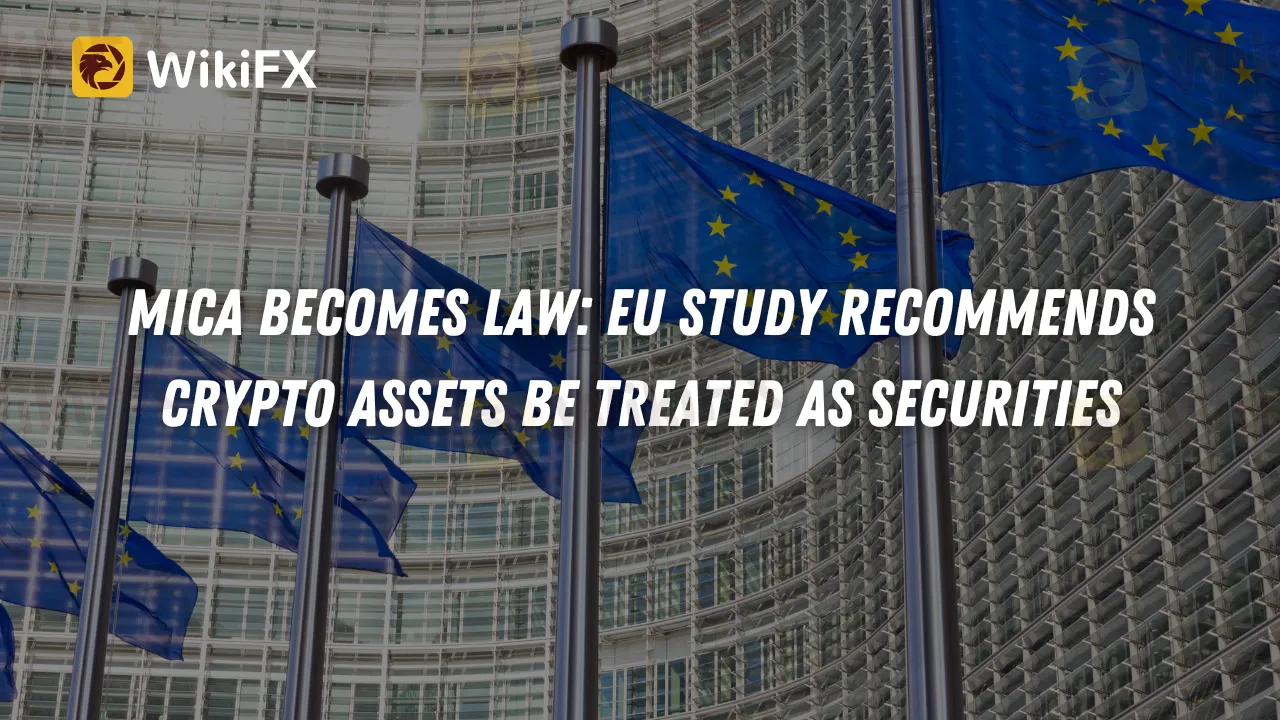简体中文
繁體中文
English
Pусский
日本語
ภาษาไทย
Tiếng Việt
Bahasa Indonesia
Español
हिन्दी
Filippiiniläinen
Français
Deutsch
Português
Türkçe
한국어
العربية
MiCA Becomes Law: EU Study Recommends Crypto Assets Be Treated as Securities
Abstract:The EU has enacted the MiCA regulations, recommending crypto assets be treated as securities. This major step towards crypto regulation could influence global crypto trading and rules.

The European Union (EU) has officially put its foot down on digital currency regulation by enacting the Markets in Crypto-Assets (MiCA) rules, providing a broad-based regulatory framework for the burgeoning crypto industry. The move is accompanied by a study commissioned by the EU Parliament suggesting that the default status of crypto assets should be that of securities, with any deviation from this rule requiring authorization from national authorities.
The completion of MiCA marks a significant step towards more rigorous regulation in the rapidly evolving world of crypto. The study commissioned by the EU Parliament emphasizes the default classification of crypto assets as securities, underscoring the regulatory challenges posed by the swift pace of advancements in the crypto sector and championing a more streamlined method of regulation.
The enforcement of these regulations provides some vindication for Gary Gensler, the Chair of the Securities and Exchange Commission (SEC) in the United States. Gensler, despite facing backlash from the crypto community, has consistently maintained that the majority of crypto tokens should be considered securities. The EU's enforcement of MiCA could potentially serve as a template for the United States to learn from and adapt to its regulatory landscape.
Moreover, U.S. SEC Commissioner Hester Peirce has interpreted the EU's enforcement of MiCA as an insightful learning opportunity for her country. As the regulatory environment for crypto assets continues to evolve and transform globally, authorities worldwide are keeping a vigilant eye on these changes, aiming to ascertain the most effective methods to safeguard investors and maintain market equilibrium.
In light of this advancement, the crypto industry has entered a critical juncture. The EU's MiCA guidelines, accompanied by the proposal to classify crypto assets as securities by default, set the stage for enhanced control and transparency in the digital currency market. This landmark development signals the possibility of a worldwide shift in crypto regulations, with potential implications for how digital currencies are traded and regulated across the globe.
As this new age of crypto regulation dawns, it's imperative for industry stakeholders and investors to stay abreast of the latest news and developments. Ensure you're in the loop by downloading the WikiFX App on your smartphone. Stay informed and navigate the dynamic crypto landscape with ease.
Download the App here: https://social1.onelink.me/QgET/px2b7i8n

Disclaimer:
The views in this article only represent the author's personal views, and do not constitute investment advice on this platform. This platform does not guarantee the accuracy, completeness and timeliness of the information in the article, and will not be liable for any loss caused by the use of or reliance on the information in the article.
Read more

Thinking of Investing? Read Must-Know Facts About Funding pips!
When you check the internet for Funding Pips, you'd be surprised to know it's filled with praise for Funding Pips but often lacks the real facts that traders need. Everything that seems too good to be true should always be verified first. It could be Fraud . So, we conducted research and collected several facts you must know about Funding Pips.

OctaFX Back in News: ED Attaches Assets Worth INR 134 Cr in Forex Scam Case
The Enforcement Directorate (ED) in Mumbai has attached assets worth around INR 131.45 crore. This included a luxury yacht and residential properties in Spain. Read this interesting story.

CryptoCurrency Regulations in India 2025 – Key Things You Should Know
Cryptocurrency has become a major trend in today’s world. Crypto Experts believe it’s the future, which is why many people are investing heavily in it. But before jumping in, it’s important for crypto enthusiasts to understand the key rules about cryptocurrency in India.

Truth About Angel One – Here’s What You Need to Know
Thinking about investing in Angel One? Wait! Know the essential things about the broker before Invest. It could be SCAM. Read, think, and invest .
WikiFX Broker
Latest News
Forex Hedging: Is It a Trader’s Safety Net or Just an Illusion?
OPEC+ members agree larger-than-expected oil production hike in August
Top Wall Street analysts are pounding the table on these 3 stocks
Stock futures fall after Trump team says tariffs will go into effect on Aug. 1: Live updates
Asia-Pacific markets mixed after Trump shifts goalposts on tariffs again
FCA clarifies expectations on bullying, harassment and violence to deepen trust in financial service
Asia-Pacific markets set for mixed open after Trump shifts goalposts on tariffs again
CNBC Daily Open: Most people don't start a political party after separation
Asia-Pacific markets mostly lower after Trump shifts goalposts on tariffs again
Currency Calculator


